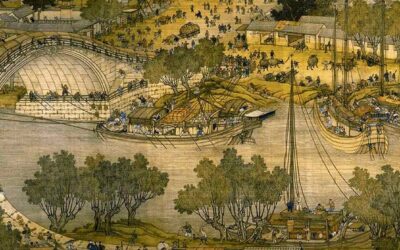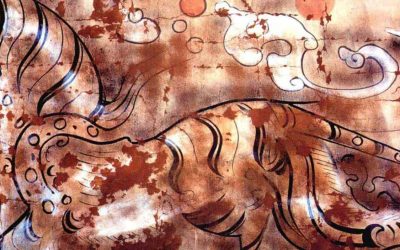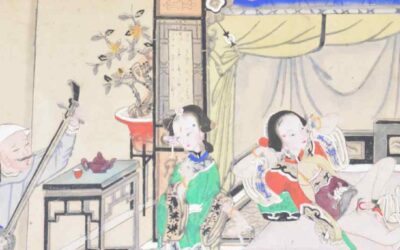Portrait of a Mandarin in 1800
This was the year in which a very interesting book was published, which through 60 portraits, tried to show some aspects of life in China to the western public. A book now in the public domain, from which we adapted «A Mandarin of distinction, in his ceremonial habit.»
The dress of a Chinese is suited to the gravity of his demeanour. It consists, in general, of a long vest extending to the ankle: the sleeves are wide at the shoulder, are gradually narrower at the wrist, and are rounded off in the form of a horse-shoe, covering the whole hand when it is not lifted up. No man of rank is allowed to appear in public without boots, which have no heels, and are made of satin, silk, or calico. In full dress he wears a long silk gown, generally of a blue colour and heavily embroidered; over this is placed a surcoat of silk, which reaches to the hand, and descends below the knee. From his neck is suspended a string of costly coral beads. His cap is edged with satin, velvet, or fur, and on the crown is a red ball with a peacock’s feather hanging from it: these are badges of distinction conferred by the emperor. The embroidered bird upon the breast is worn only by mandarins high in civil rank, while the military mandarins are distinguished by an embroidered dragon. All colours are not suffered to be worn indiscriminately. The emperor and the princes of the blood only, are allowed to wear yellow; although violet colour is sometimes chosen by mandarins of rank on days of ceremony. The common people seldom wear any other than blue or black, and white is universally adopted for mourning.
— The Chinese carefully avoid every word or gesture which may betray either anger or any violent emotion of the mind. They entertain the highest reverence for their parents, and respect for the aged. They are enthusiastic admirers of virtue, and venerate the memory of such of their nation as have been celebrated for a love of justice and of their country, With this singular people neither riches nor birth can ever establish the smallest claim to honours. Personal merit is the sole basis upon which any man can raise himself to distinguished rank. Talents and virtue are indispensably requisite for those in power ; and where they are deficient, every advantitious or hereditary pretension is totally disallowed.
De George Henry Mason. The costume of China: illustrated by sixty engravings: with explanations in English and French. London, 1800.

Last posts
The Qingming Festival: From Spring Celebration to Festival of the Dead
The Qingming Festival: From Spring Celebration to Festival of the Dead The Qingming Festival (清明节) is today China’s Day of the Dead—the time when people remember their deceased relatives and travel to cemeteries located on the outskirts of cities, or to tombs built in...
Linghu Zhuan’s Skepticism Leads Him to the Underworld
Linghu Zhuan’s Skepticism Leads Him to the Underworld Linghu Zhuan was a man of great integrity who did not believe in gods or spirits. Whenever someone spoke of ghostly transformations or divine retribution in the afterlife, he refuted their words with compelling...
Did a Taoist Art of the bedchamber of male Homosexuality Exist?
Did a Taoist Art of the bedchamber of male Homosexuality Exist? This is the question posed by Zhang Wanrong in an intriguing article published last year in the journal Religions[1]. The Taoist Art of the bedchamber For those unfamiliar with the topic, among the...







